The Power of Pro Bono
Jeanne Gang, Bernarda Wong, Noah Resnick, Brian Hurttienne, & John Peterson
Mar 01, 2011
(6pm)
Panel Discussion
Please RSVP:
Celebrate the Chicago launch of the book The Power of Pro Bono, with a panel discussion and reception sponsored by Holcim Awards for Sustainable Construction.
The panel will give in-depth perspectives of projects featured in the book, including the Kam Liu Building of the Chinese American Service League in Chicago and the Roosevelt Park Masterplan from Detroit. Representatives from the firm and nonprofit client will be on the panel, moderated by Public Architecture’s Founder and President, John Peterson. The panel will discuss community involvement, the role of pro bono service in professional practice and how design can impact change locally.
Panelists include:
Jeanne Gang// Principal, Studio Gang
Bernarda Wong// President, Chinese American Service League
Noah Resnick// Principal, uRbanDetail
Brian Hurttienne// Architect & Community Activist, Corktown, Detroit
John Peterson// Founder & President, Public Architecture
ABOUT THE BOOK
The Power of Pro Bono presents 40 pro bono design projects across the country. The clients include grassroots community organizations like the Homeless Prenatal Program of San Francisco, as well as national and international nonprofits, among them Goodwill, Habitat for Humanity, KIPP Schools and Planned Parenthood. These public-interest projects were designed by a range of award-winning practices, from SHoP Architects in New York and Studio Gang in Chicago, to young studios including Stephen Dalton Architects in Southern California and Hathorne Architects in Detroit, to some of the largest firms in the country, such as Gensler, HOK and Perkins + Will. Scores of private donors, local community foundations and companies, and material and service donations made these projects possible. So have some of the most progressive funders in the country, ranging from Brad Pitt's Make It Right Foundation in New Orleans to the Robin Hood Foundation in New York. Taken as a whole, the selected works represent six general categories: Arts, Civic, Community, Education, Health and Housing. This book is inspired and informed by the advocacy and design work of Public Architecture, a national nonprofit founded in 2002 by San Francisco-based architect John Peterson. The 1% program of Public Architecture challenges architecture and design firms nationwide to pledge a minimum of one percent of their time to pro bono service, leveraging in excess of $25 million in donated services annually.
ABOUT PUBLIC ARCHITECTURE
Established in 2002, Public Architecture identifies and solves practical problems of human interaction in the built environment and acts as a catalyst for public discourse through education, advocacy, and the design of public spaces and amenities.
Related Links
Public Architecture
http://www.publicarchitecture.org/home.htm

The City as Spectacle: A View from the Gondola
Stanislaus von Moos
Feb 10, 2011
(6pm)
Talk
Please RSVP:
Venice and Modern Architecture, or Venice and Modernism altogether make an odd couple. According to Filippo Marinetti, the author of the Futurist Manifesto (1909), gondolas are no more than “rocking chairs for idiots.” One hundred years later, we must acknowledge that rather than being its opposite, the passatismo castigated by Marinetti is a powerful aspect of modernity. In fact, John Ruskin’s incantations of the waves of the laguna dangerously rippling against the “Stones of Venice” have transformed the city into one of the 20th century’s proverbial tourist destinations and resulted in an extravagant race against Las Vegas. The lecture is about the architecture of Robert Venturi and Denise Scott Brown and the way it has turned this race into art.
Stanislaus von Moos, a Swiss Art Historian, has published monographs on Le Corbusier (1968ff.), Italian Renaissance Architecture, the History of Industrial Design in Switzerland (1992) and the Architecture of Venturi, Scott Brown & Associates (1st volume 1987; 2nd volume 1999). More recently he published Le Corbusier Before Le Corbusier (ed., with Arthur Rüegg, 2001) and Ernst Scheidegger. Chandigarh 1956 (ed., 2010). Currently he is interested in the culture of the Cold War era and the cross-pollinations between architecture and the visual arts since 1970. He has been professor of Modern Art at the University of Zurich (1983-2005) and is presently the Vincent Scully Visiting Professor at Yale University.

You Can Have Your Cake and Eat It, Too
Bill Mackey
Jan 27, 2011
(6pm)
Talk
Please RSVP:
On January 27, 2011, Bill Mackey will give a graphic presentation that discusses the relationship of shoelaces, NCAA basketball, Paris, Oprah, golf carts, street signs, and sex to American perceptions of land use and transportation. The critical analysis utilizes humor and parody to question our roles as actors in society and asks audiences to dream of other possibilities for our landscape.
In 1995, Mackey created Worker, Inc. with the intention of bridging the social sciences, planning, architecture, and art. In 2007, he created the Neighborhood Residents Resources Ethnography Studies Unit, a division of Worker, Inc., to understand local physical environments with an emphasis on data. He conducts on-the-ground research and displays it in small pamphlet publications that combine language, humor, pen and ink drawing, ethnographic research, and graphic arts into a concise and finely executed document that offers a fresh, and often surprising, perspective on human environments. Mackey received a 2010 grant from the Graham Foundation for his Field Guides and Checklists series.
Since 1969, Mackey has had 19 different addresses, 23 bedrooms, 10 pets, 15 jobs, played 25 different sports, ingested 20 types of drugs, had 9 surgeries, been to 2 counselors, visited 16 countries, enjoyed listening to 7 genres of music, tried to play 4 musical instruments, received 3 college degrees, owned 7 bicycles, 4 automobiles and 3 golf carts.
Mackey is an architect and was lead designer for a variety of public and private projects in the southern Arizona region. His architectural design work is recognized in national publications and earns regional design awards. Mackey is a co-founder of the design co*op and was Architect-in-Residence at the Museum of Contemporary Art in Tucson, Arizona in 2009.
Related Links
Worker, Inc.
http://www.workerincorporated.com/

Hair, Heir, Heire: Paratextual Modernity and Learning from Las Vegas
Michael Golec
Jan 06, 2011
(6pm)
Talk
Please RSVP:
In “Hair, Heir, Heire: Paratextual Modernity and Learning from Las Vegas,” Michael J. Golec will explore how paratextual, or graphic formatting, of Robert Venturi, Denise Scott Brown, and Steven Izenour’s Learning from Las Vegas (1972) and Learning from Las Vegas (1977) influences the textual meaning of these two books. By focusing on the photographic images in the 1972 and 1977 books and in Las Vegas Studio exhibition, Golec asks, “What can we learn from paratextual formatting such that we can have two books that can convey such distinct meanings in their material manifestations?”
Michael J. Golec is an Anshutz Distinguished Fellow in American Studies and Visting Associate Professor of Art and Archaeology at Princeton University. He is an Associate Professor of the History of Design at the School of the Art Institute of Chicago. And, along with Aron Vinegar, Golec is a coeditor of and contributor to Relearning from Las Vegas, published by the University of Minnesota Press. The book is available for purchase at the Graham Foundation.

Holiday Party and Bookshop Launch
Dec 16, 2010
(5pm)
Reservations are suggested
Toast the holiday season and the kick off of the Graham Foundation's mini book store in the library. Please join us from 5PM to 8PM to enjoy the Graham Foundation's current exhibition, Las Vegas Studio: Images from the Archives of Robert Venturi and Denise Scott Brown, and shop its new book store for holiday gifts. All titles will be 20% off including,
...the exhibition catalogue,
Las Vegas Studio
EDITED BY HILAR STADLER AND MARTINO STIERLI
...a new collection of essays by Denise Scott Brown,
AA Words 4: Having Words
DENISE SCOTT BROWN
...classics,
Learning From Las Vegas
ROBERT VENTURI, DENISE SCOTT BROWN & STEVEN IZENOUR
Complexity and Contradiction in Architecture
ROBERT VENTURI
...recent grantee publications,
Log 20: Curating Architecture
ANYONE CORPORATION
Katarina Grosse: Atoms Inside Balloons
ESSAYS BY DAVID HILBERT AND NANA LAST
Architecture's Historical Turn, Phenomenology and the Rise of the Postmodern
JORGE OTERO-PAILOS
& more!
Book sale proceeds benefit the Graham Foundation's public programs.

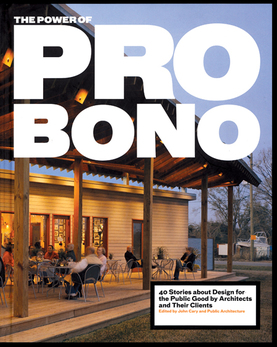
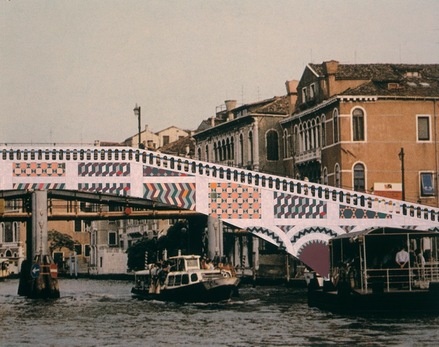
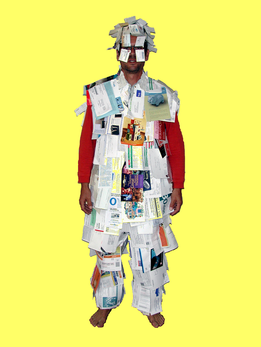
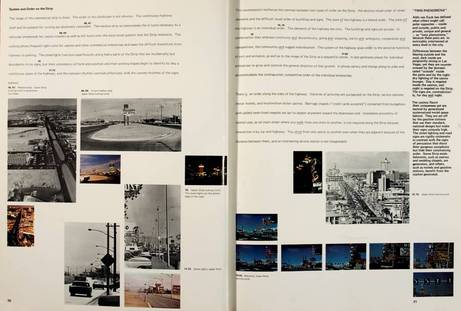
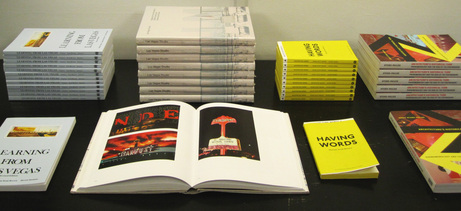
 PREVIOUS POSTS
PREVIOUS POSTS